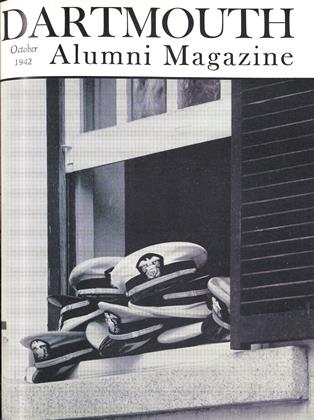Probably the excessive use of the WOrd "streamlined" operates to create a sense of distaste in many minds whenever it finds fresh application, but it is bound to be applied to the current trend in college education. That trend, already noticeable, has been accelerated by the war and its demand for speeding up the process of college education in whatever ways be possible; but in the wake of the war program comes a demand, which has found some prominent sponsors, that what has gained a toe-hold as an emergency measure shall be made permanent in the realm of higher education.
What it seems to come down to is a proposal that no more than two years of study be required for the A.B. degree, which would be bestowed, if the plan be generally adopted, at the end of sophomore year. It further appears to involve something like a thrusting down of what has hitherto been freshman and sophomore work into the realm of the preparatory schools, somewhat in analogy to the treatment of what used to be high school education by thrusting its initial stages back into the grammar grades. In essence it seems to be a conflict between the universities and the liberal arts colleges. And the darker view is that a general spread of this doctrine will doom liberal arts colleges to drastic restriction, if not to downright abolition.
Protagonists of both schools of thought have been prompt to rally to the defense of each, inspired thereto by the outgivings of President Hutchins of Chicago, the chief exponent of the streamlined theory of education. A very thoughtful and clarifying discussion of the arguments opposed to the plan of Dr. Hutchins appeared during the summer in Harper's magazine from the president of Hamilton College W. H. Cowley. Dartmouth '34 who devoted his article to the defense of the four-year liberal arts colleges as instruments essential to fitting men for life, liberty and the pursuit of happiness prior to their special training for professional life.
It is dangerous for mere laymen to pontificate in any such matter, but the temptation is strong, especially among such of us as serve the liberal arts colleges and who would feel that the abandonment of their work would operate not to enrich but to impoverish American life. It is rather heartening to such to find that President Cowley expects the current attacks to fail as they have done in the past for these assaults are not entirely new. Exponents of university training have been at the job of abolishing the liberal arts colleges at sporadic intervals during the past century, striving to sell the idea that the American system is all wrong and the German system ideally right.
Each to his taste. It is natural for those devoted to such a college as Dartmouth, which has steadfastly set its face against the attempt to become a university, to approve Mr. Cowley's argument that higher education should bend its energies to producing men rather than machines, personalities rather than professional pundits. Before a man is fit to become an expert in law, in medicine, in engineering, or in any other line, he should be fit to live in and enjoy to the full the world in which he lives and works. The American produced by the American system still seems to us to be preferable to the German produced by the German system. There may be a vague resemblance to the admonition, "Seek ye first the kingdom of God and his righteousness and all these things shall be added unto you." Let the liberal college lay the foundation fit for the professional structure to rise upon. It is debatable that four years is too long a period to devote to this, and far less debatable that two years is too short a time for it.
 View Full Issue
View Full Issue
More From This Issue
-
 Article
Article'Round the Girdled Earth
October 1942 By John French JR. '30 -
 Lettter from the Editor
Lettter from the EditorLetters from Tom Braden '40
October 1942 -
 Article
ArticlePresident's Address Opens 174th College Year
October 1942 -
 Article
ArticleDartmouth War Directory
October 1942 -
 Article
ArticlePay-As-You-Go Taxation
October 1942 By BEARDSLEY RUML '15 -
 Class Notes
Class Notes1918*
October 1942 By ERNEST H. EARLEY, DONALD L. BARR











